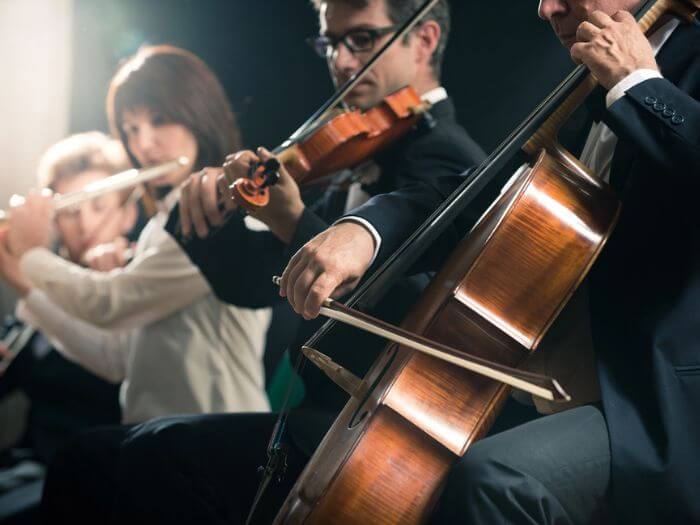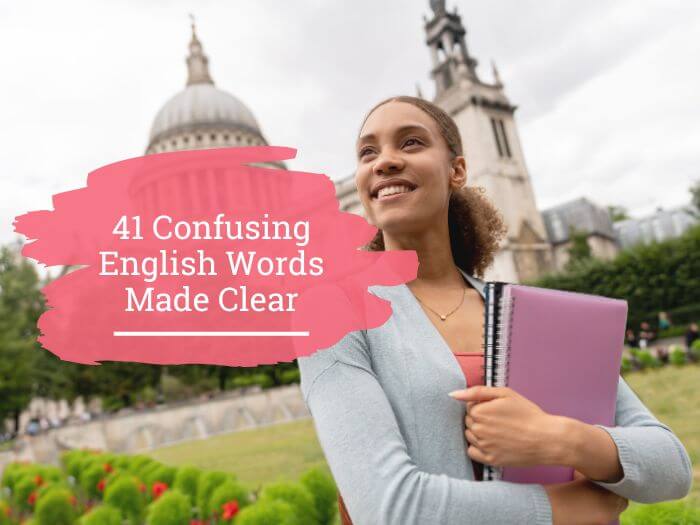There are some confusing English words and expressions out there.
Some of these may even confuse English native speakers!
Let’s clarify 41 pairs of confusing English words that cause trouble, so you can use them correctly and sleep well tonight.
Table of Contents
Confusing English Words A
1. Advice vs Advise
“Advice” is a noun. It’s an opinion or a suggestion about what somebody should do in a particular situation.
At the beginning of 101 Conversations in Simple English, I give you some advice on how to read the book.
I say, “You don’t need to understand every word, just the main ideas. If you can, that’s enough! You’re set! You can understand and enjoy a great amount with gist alone, so carry on through the material and enjoy the feeling of making progress! If the material is so hard that you struggle to understand even the gist, then my advice for you would be to consider easier material.”
“Advise” is the verb. It means “to give someone advice”. You can advise someone against something, or advise someone to do something.
Here are a couple of examples.
- I strongly advise you to read and listen a lot if you want to learn a language.
- I always advise my students against worrying too much about grammar rules when they speak.
2. Affect vs. Effect
If something affects you, it influences you.
Here’s an example from my book, Short Stories in English for Beginners: Read for pleasure at your level, expand your vocabulary and learn English the fun way!
Laura doesn’t know what to do. Finally, she makes a decision. ‘I don’t know how long that light will affect me,’ she says. ‘I’m invisible! I have to enjoy it!’
An “effect” is the change or result caused by something or someone.
Here’s another example from the same story.
Laura is on her way back to Edinburgh. She wants to enjoy the effects of her invisibility. The best place to completely experience it is in public. As she drives, her friends make an important phone call – to the police!
3. Alone vs Lonely

When no one is with you, you’re alone.
Here’s a dialogue from 101 Conversations in Simple English: Short Natural Dialogues to Boost Your Confidence & Improve Your Spoken English.
Alice: Pauline seems like a good nanny. But it is normal that Mariana is alone in the house, like she was yesterday?
Lawrence Windsor: Yes. Not often, but it does happen sometimes.
If you’re lonely, it means that you are sad because you have no friends or people to talk to. Some people are happy to be alone, but no one can be happy if they’re lonely!
Here’s an example from Chapter 3 of Short Stories in English for Beginners.
Aldin couldn’t believe it. Maha was the daughter of the Kalkian Emperor! The girl could cause world chaos! And all because she was lonely? Because she thought Emperor Valior understood her problems? What had she done?!
4. Altogether vs All together
“Altogether” means “completely.”
Some examples:
- These ridiculous costs are forcing many students to bypass college altogether.
- The lifestyle during those days was altogether different.
- Altogether those sums total $71 billion.
“All together” means “with each other”
- Example: I picked up the clothes and put them all together in one pile.
5. Allusion vs Illusion
An allusion is an indirect reference to someone or something.
- Example: The author made an allusion to Shakespeare in the poem.
An illusion is a false impression, idea, or belief.
- Example: Optical illusions are usually harmless and are actually entertaining.
6. Amount of vs Number of
“Amount of” is normally used with uncountable nouns.
Here’s an example from Short Stories in English for Beginners.
Alfred looked at him. ‘So that was the end of the magic water?’ ‘Not quite,’ replied Lars. He gave Alfred a serious look. ‘Arthuren had a small amount of magic water saved. And he knew a secret.
“Number of” is normally used with countable nouns.
In my books, I included a glossary to explain some tricky terms, and I used “number of” in the definition of the word “population.”
Population: the number of people who live in an area
7. Arise vs Rise
“Arise” means “happen” or “start to exist.” We often use it when talking about problems or difficult situations and it’s a rather formal verb.
- Example: Very serious problems can arise if your heart stops pumping effectively.
“Rise” means “go up,” “get up,” or “increase.” The past form is “rose.”
Here’s an example from Short Stories in English for Beginners: Read for pleasure at your level, expand your vocabulary and learn English the fun way!
The men rose with the sun. They ate some of the supplies left from the journey. They also had meat from the hunt.
In this example, “rise” means “get up.”
Here are two more:
- The sun rises in the east and sets in the west. (rise = go up)
- Prices have risen a lot in the last few months! (rise = increase)

8. At the end / In the end
“In the end” means “finally” or “after a long period of time or series of events.”
Have a look at this example from Short Stories in English for Beginners.
George went one way. Sylvia went the other. Sylvia saw no sign of the creature. She thought more about it. In the end, she came to the simplest conclusion. She and George imagined the creature. It was not real.
If something happens at the end, it happens in the final part of a period of time, an event, an activity or a story.
Here’s my example from the book.
Carl worked very long hours. He usually worked late. His workshop was near Eastern Green Beach. At the end of the day, he often went to the beach to stretch his legs.
Confusing English Words B-D
9. Beside vs Besides
“Beside” is a rather formal way to say “next to.”
Here’s how I used it in a story from Short Stories in English for Beginners.
Aldin sat down beside Maha. He looked at her closely. ‘You can stay here for now,’ he explained. ‘But you have to understand. Our two worlds are at war.’
“Besides” means “in addition to.”
- Example: My partner and I have a lot of things in common besides music.
10. Between vs. Among
“Between” is used to talk about two things that are clearly separated.
The following is an example from Short Stories in English for Beginners.
I get into the back of the lorry. I sit down between a couple of boxes of rice. The driver starts the lorry. We head for Barcelona.
We use “among” to talk about more than two things that aren’t clearly separated because they are part of a group.
Here’s an example from my book.
The old man and I get out the back door. The old man hides among the people on the street. I thank the driver. ‘You’re welcome,’ he says. ‘Have a good day!’
11. Come back vs Go back
We use “come back” when the movement is toward the speaker or the place where the speaker is. In other words, when you go from there to here.
We use “go back” when the movement is away from the speaker to another place or position.
For example, let’s say I’m in Italy and you’re in France. If you return to France after visiting me, you go back to France. But if I ask you to visit me again in Italy, I’d say, “Please come back to Italy soon.”
Here are a couple of stories from Short Stories in English for Beginners.
- Walter smiled. He opened the garage door. ‘Where are you going?’ David asked. ‘I’m finished here,’ replied Walter. ‘Remember that number. And read this.’ He handed David a letter. Then he walked away. ‘Wait! Come back! Don’t you want the necklace?’ called David. But Walter was gone. He had disappeared through the doorway.
- Eskol continued, ‘The village chief tells me some of those Vikings left. They tried to go back to their homeland.’ He paused. ‘I have met those men,’ he continued. ‘They told me about this land. They, too, are dead. They died from exhaustion after the trip.’
12. Classic vs Classical

When we say that something is “classic,” we mean it’s of very high quality and one of the best of its kind.
- Example: Pulp Fiction by Quentin Tarantino is considered a classic crime movie from the ‘90s.
We also use “classic” to describe the most typical example of something.
- Example: What I’ve included in this blog post are classic examples of commonly confused words.
“Classic” can also be a noun to describe famous books, films or songs that are considered to be of very high quality.
- Example: George Orwell’s 1984 is a classic.
“Classical” describes a form of traditional Western music and other things that are traditional in style.
- Example: I love classical music. Mozart is my favourite classical composer.
13. Compliment vs. Complement
A compliment is something polite you say to someone in order to praise them. You may do this because you like their appearance, appreciate their qualities something they have done.
- Example: They gave me a kind compliment about my English!
A complement, however, is something that adds new qualities to something in a way that improves it. I used this word at the beginning of 101 Conversations in Simple English to describe my book.
Suitable for beginners and intermediate learners alike, “101 Conversations in Simple English” is the perfect complement to any English course and will give you the ultimate head start for using English confidently in the real world!
14. Desert vs Dessert
A “desert” is a dry area of land.
- Example: The Sahara is the largest desert in the world.
A dessert is a sweet course eaten at the end of a meal. A dessert may be dry too if the person who makes it isn’t that good.
- Example: I’ll have chocolate cake for dessert.

15. Despite vs Although
We use these to express a contrast between two things. The meaning is similar but there’s a grammatical difference.
We use “despite” with a noun, a pronoun (he, she, etc.), or gerund (a verb ending in “-ing” used as a noun).
Look how I used “despite” in this story from Short Stories in English for Beginners.
Craig puts down the phone. He starts to cry harder. Laura realizes something else. Craig loves her very much. She looks at him. She can see he is really suffering. Laura makes a decision right then. Despite their problems, she wants to sort out their relationship!
In that last sentence, you can’t replace “despite” with “although” because “although” must be followed by a subject and a verb.
The following 3 sentences I’ve taken from Short Stories in English for Beginners will show you what I mean.
- Although it was a Sunday, there were several people around.
- Although he was not a warrior, he was very good at hunting.
- Although people can’t see or hear her, some people can feel her.
Confusing English Words E-F
16. Each vs Every
“Each” and “every” are similar and sometimes they can be used interchangeably. But they’re not exactly the same.
We use “each” when we want to refer to individual things or people in a group.
Have a look at this short paragraph I wrote in Short Stories in English for Beginners
Enjoying what you read keeps you coming back for more. The best way to enjoy reading stories and feel a sense of achievement is by reading each story from beginning to end.
Here I’m emphasising the stories, one by one.
“Every,” on the other hand, is used when we want to refer to things or people as a group. The meaning of “every” is similar to “all”.
Have a look at this paragraph from my book. It’s a clear example of the use of “every.”
One of the main benefits of reading in a foreign language is that you gain exposure to large amounts of words and expressions used naturally. This kind of reading for pleasure in order to learn a language is generally known as ‘extensive reading’. It is very different from reading a textbook in which dialogues or texts are meant to be read in detail with the aim of understanding every word.
17. Economic vs Economical
Both of these are adjectives.
“Economic” describes something connected with the economy of a country.
- Example: Our economic crisis has already caused great pain.
We say something is “economical” when it doesn’t require a lot of money to operate.
- Example: My car only uses a small amount of petrol. It’s quite economical.

18. Emigrate vs Immigrate
If you emigrate, you leave your own country to go and live permanently in another one. You can emigrate to one country from another.
If you immigrate, you come and live permanently in a country after leaving your own. You can immigrate from one country to another.
A couple of examples:
- My family emigrated from Italy to the United States in the 1970.
- Millions of people immigrated to the United States in the 1970.
19. Especially vs Specially
Both these words are adverbs and it may be difficult to hear the difference when people speak.
“Especially” means “particularly” or “above all”. This word doesn’t usually come at the beginning of a sentence.
Here’s an example from Short Stories in English for Beginners.
My sister is very shy. She’s especially shy when she meets new people. ‘Hello … Armando,’ she says. Her face turns red. Then she becomes quiet.
“Specially,” on the other hand, usually means “for a particular purpose.”
- Example: My books were specially written to help you improve your English language skills.
20. Even if vs Even though
“Even though” means “despite the fact that.” It’s similar to “although” but it’s more emphatic.
“Even if” means “whether or not.”
Compare the following pair of sentences:
- I’ll go for a run even if it rains.
- I went for a run even though it was raining.
The first sentence means I’ll go for a run whether or not it’ll rain.
The second one means that I went for a run despite the fact that it was raining.
21. Farther vs Further
The comparative form of “far” is “farther” or “further.”
In Short Stories in English for Beginners, I wrote this:
Walter had never travelled far. He had travelled around his home in Scotland. But he had not gone farther.
But I could have also used “further” in that sentence.
In British English “further” is more common. “Farther” is more used in American English.
“Further,” however, can also mean “additional” or “more.” “Farther” can't be used in this way.
- Example: Do you have any further questions?
22. Female vs Feminine
“Female” may be either a noun or an adjective that refers to the sex of women (or animals that lay eggs or give birth to babies).
Here’s a short story for you from Short Stories in English for Beginners.
Thoric went back to his house. He spoke to his parents and sister. His family were farmers. They had a little piece of land. They grew some crops. They raised animals as well. They kept the females. They sold the males.
In the passage above, I used “female” as a noun. But because “female” is also an adjective, you can use it to describe a noun.
Here’s an example:
- The website is very popular amongst female vocal enthusiasts.
“Feminine” is used to describe the qualities that we consider to be typical of women.
- Example: She looks so feminine when she wears that dress.
23. Fun vs Funny

In my experience, these are some of the most confusing English words for learners, so let’s clarify them once and for all.
If something is funny, it makes you laugh. A comedian, movie, or joke can be funny.
Here’s my example from Short Stories in English for Beginners
‘Hello?’ she shouted. ‘It’s Sylvia!’ No one answered. Suddenly, a noise came from within the house. OK, George, thought Sylvia. This isn’t funny anymore! Sylvia went to the door and opened it. She was totally unprepared for what she saw.
If something is fun, it means it’s pleasurable and enjoyable. Learning English is fun, isn’t it?
Laura wants to reach out and touch her husband. Then she remembers – she’s invisible. He’ll be afraid. For the first time, Laura starts to consider her situation. Being invisible is generally fun. It has advantages. However, she doesn’t want to be this way forever!
Confusing English Words H
24. Hard vs Hardly
“Hard” is an adjective that describes something that is difficult or requires a lot of effort.
Here’s an example from Short Stories in English for Beginners.
The trader looked around him. Then he looked at the knight. ‘I don’t have any here. There is not much these days. The … uh … “item” I need to make it is hard to find.’
“Hard” is also used as an adverb describing an action that’s done with great effort or with difficulty.
Have a look at another example from Short Stories in English for Beginners.
Carl didn’t know what to say. He thought hard. Then he continued. ‘I think I know how it works,’ he lied.
(In this context, “hard” means “done with a lot of effort.”)
“Hardly” is never an adjective, so you can’t say “Learning Chinese is hardly.”
“Hardly” is an adverb meaning barely, almost not, or scarcely.
I used this word too in my book. Here’s an example.
The Silent Woods were very dark. The trees were tall. You could hardly see daylight.
25. Hear vs Listen (to)

Both of these have to do with your ears. The difference between them is that hearing is considered more of a natural event than an action. When you hear a sound, you naturally become aware of it.
Listening, on the other hand, is more intentional. It’s something you do consciously.
Here are two extracts from one of the stories in Short Stories in English for Beginners.
Extract 1 (hear): Laura walks into a store. Although people can’t see or hear her, some people can feel her. She has to be careful. She picks up some shoes and a dress. She looks, but then replaces them. She likes being invisible, but she doesn’t want to steal.
Extract 2 (listen): Laura watches her friends. Raj takes the food off the barbecue. Sophie puts cold drinks on the table. Laura listens to their conversation.
26. High vs Tall
“High” is not used to describe the height of a person. We use “tall” for that.
Here’s an example from Short Stories in English for Beginners.
I’m tall, about six feet. I have longish brown hair. My eyes are green and I have a wide mouth.
We can also use “tall” for buildings and trees. Here are two more examples from my book.
‘I like to see how things have changed. There are no more pirates. There are just tall buildings everywhere. And did you know there are now flying machines? Unbelievable!’
The group continued on their way. Soon, they left the woods. The sun was out. The trees weren’t as tall. They had a beautiful view of the countryside.
We use “high” to describe the distance of something from the ground.
- Example: Those are very high mountains!
27. Historic vs Historical
Something “historic” is important in history. We also use this adjective to describe something likely to be considered important at some time in the future.
- Example: Today is a historic day for our country.
“Historical” usually describes something connected with the past or with the study of history.
- Example: I love doing historical research about the Middle Ages.
28. House vs Home
A “house” is the building where someone lives.
Here’s the summary of a chapter from Short Stories in English for Beginners.
Sylvia and George look for a strange creature in the woods. George disappears. Sylvia goes to the old house to find him. He isn’t there. She falls asleep. She wakes up the next day. George still isn’t there. She is worried. She calls George. He doesn’t answer. She goes to his house. She sees his car. But she can’t find him and she can’t find her friends. She finally returns to the old house. There are lights on in the house.
A “home” is more than a building. It still used to refer to someone’s house, only in a more personal and emotional way.
- Example: I love this building. It’s my home!

Confusing English Words I-M
29. Lay vs Lie
The verb “lay” means “to put something down in a flat position.” It’s a transitive verb, which means it’s a verb that takes an object.
- Example: She laid the baby on the bed and fell asleep.
Notice that “lay” is an irregular verb in English (lay – laid – laid)
“Lie” means “to be in or put yourself into a flat position,” and it’s intransitive, so it doesn’t take an object.
I used this verb at the beginning of one of my stories from my book, 101 Conversations in Simple English.
Detective Smith handcuffs Robert Green, with his hands behind his back. She radios the police car and tells them to send an ambulance. Then, under the watchful gaze of Natalie, Alice and Pete, she opens the briefcase, which is lying on the ground. Inside are the Turner drawings!
“Lie” is also a verb that means “to say or write something that isn’t true”.
An example from Short Stories in English for Beginners.
Alfred was angry. ‘We have paid the gold for nothing? You betrayed me, Lars!’ he cried. ‘You betrayed King Andur!’ ‘Yes, I lied. But I did it to maintain peace,’ said Lars.
These two words can be quite confusing for native speakers of English too.
Here’s why.
Base form | lay (put something down) | lie (be horizontal) | lie (say something that is not true) |
Past simple | laid | lay | lied |
See how small these differences in meaning and spelling are?
That’s exactly the problem!
30. Lend vs Borrow
When you lend something to someone, you give it to them for a short time, expecting that you’ll get it back.
A couple of examples.
- Can you lend me your pen for a second?
- I’ll never lend him my car anymore. The last time I did he crashed it into a tree!
“Borrow” is kind of the opposite. When you borrow something from someone, you take it from them for a short time.
- Example: I went to the library and borrowed a few horror books to read over the holidays.
31. Library vs Bookshop vs Bookshelf
This is a particularly tricky trio of words, especially for some speakers of Latin-based languages like Italian and Spanish.
The difference is simple.
- A library is where you borrow books.
- A bookshop is where you buy them.
- A bookshelf is where you put them.
Here’s a story-example.
I went to the library but couldn’t find the book I was looking for. I was upset because I really wanted to read it! I even had an argument with the librarian. Disappointed, I went home and realised I had no choice but to buy the book. I ordered it from the online bookstore and it arrived the next day. The book has been sitting on my bookshelf for 3 years. I haven’t read it yet.

32. Loose vs. Lose
“Loose” is an adjective that describes something that’s not fixed in place.
- Example: Rappers usually love wearing loose clothes.
If you lose something, you either misplace it or don’t win it.
Here’s an example from Short Stories in English for Beginners.
The time had come. The English ships had arrived. They began firing their cannons. The pirate boats fired their cannons back. The ships rocked as the cannon balls hit around them. Eric shouted at his men, ‘Come on! Keep firing! We can’t lose!’
33. Male vs Masculine
As you can imagine, the difference between “female” and “feminine” is the same as the one between “male” and “masculine.”
Male refers to the sex of men (or animals that don’t lay eggs or give birth to babies).
- Example: What a cute little dog! Is it male or female?
“Masculine” is used to describe the qualities that we consider to be typical of men.
- Example: His style is fascinating and rather masculine.
34. Much vs Many
Many English language learners often confuse these words. The difference is simple: “much” is used with uncountable nouns while “many” is used with countable ones.
Have a look at these examples from
Many
The Emperor of the Earthlings was an old man named Valior. He was voted into the office many years ago. The election was not fair, but that did not concern Valior. He had led many wars. He had lost only a few. He was a ruler who did anything to win.
Much
My dad comes in my room. He looks at me in surprise. Why? Because I’m not dressed. ‘Daniel! Why aren’t you dressed?’ Dad asks. ‘Dressed? I just got up. I had a shower five minutes ago. I’m not even dry yet!’ ‘Come on! We don’t have much time. I want to take you to the airport. But I have to go to work, too.’
Confusing English Words N-Z
35. On time / In Time
If something or someone is on time, they arrive at the correct time.
If something or someone is in time, they arrive before it’s too late to do something.
These two sentences will clarify the difference.
- The train arrived on time, so I didn’t have to wait.
- We need to hurry up or we won’t be in time to catch the train!

36. Politic vs political
These are two adjectives.
“Politic” is a formal word used to describe someone’s actions. If it seems politic to do something, you mean to say it’s based on good judgment. It’s not a very common word though.
Here’s an example:
- Facing the economic crisis, Italy and Nazi Germany found it politic to buy Hungarian grain.
“Political” is much more common and it’s used to describe something or someone connected with the state, government or public affairs.
Here’s an example from Short Stories in English for Beginners.
Wars started everywhere. There were changing political views and agreements. Colonies fought for land, power and weapons. In the end, two main empires remained: the ‘Earthlings’ and the ‘Kalkians’. And both empires wanted it all.
37. Raise vs Rise
The big difference between “raise” and “rise” is that “raise” is a transitive verb, so it requires an object, while “rise” is intransitive and so it doesn’t take an object.
Have a look at this example from Short Stories in English for Beginners.
That night, Chief Eskol gave a second talk in the Great Hall. It was time to decide who would go on the ships. There was only room for 75 men. One by one, men raised their hands to go. Most of them were warriors.
In this story, raise means “to lift something” and it’s followed by an object (their hands).
“Rise,” as you can see in the following example as well as the ones before, doesn’t take an object.
- Example. In many states, sales tax revenues are rising.

38. Sometimes vs Sometime
“Sometimes” is an adverb of frequency that means “not always” or “occasionally.”
I used it when describing a character in one of my stories.
Eskol was a very strict man. He had many rules and laws. Sometimes he was mean. However, most people considered Eskol a good leader.
“Sometime” is also an adverb but it means” at a time that you do not know exactly or has not yet been decided.”
- Example: Shall we go bowling sometime next week?
39. Stop doing something vs Stop to do something
When you stop doing something, you don’t do that thing anymore.
Here’s an example from Short Stories in English for Beginners.
‘You look surprised, Alfred,’ said Lars.
‘I am,’ Alfred replied.
‘Why?’ asked Lars.
‘I thought the two brothers never fought.’Lars laughed.
‘Oh, I see. Well, they did. But that was many years ago.’ Lars stopped talking. The men moved on.
When you stop to do something, you stop what you’re doing to do something else.
Here’s another story from the book.
The driver gets into the lorry. Suddenly, I have an idea!
‘Excuse me?’ I say.
‘Yes?’ the driver answers.
‘Could you take me back to Barcelona?’ I ask.
‘Now?’ he says.
‘Yes,’ I reply.
‘I have little money. I must get back to my sister!’ The driver stops to think. Then he replies. ‘OK, I guess so. Get into the lorry. Sit between the rice boxes. And don’t tell anybody!’
40. Than vs. Then
Both of these are in the list of the 100 most common words in English.
“Than” is a function word (a word used to express grammatical relationships between other words) often used in comparisons.
I used it several times in 101 Conversations in Simple English: Short Natural Dialogues to Boost Your Confidence & Improve Your Spoken English.
Here’s an example.
I know that now. I didn’t know they were so valuable…. They were just drawings, so I thought they wouldn’t be much more expensive than an old comic book.
Also “then” is a function word. But this is an adverb we use to express time or a sequence of events. It’s very common in stories!
Here’s an example from Short Stories in English for Intermediate Learners: Read for Pleasure at Your Level and Learn English the Fun Way!
When Matt got back to the room, however, his class had gone! He hurried back into the hall and saw Elaine and the entire class. They were going into a room at the end of the hall. He raced down the hall and was almost to the door when it closed. Then he heard a sharp ‘click'. The door was locked.
41. Worth vs Worthwhile
“Worth” means “having a particular value” and it’s used after verbs.
Have a look at this dialogue from 101 Conversations in Simple English.
Alice: How many staff do you have?
Lawrence Windsor: Six people: a cleaner, a security guard, a gardener, two cooks and my daughter’s nanny. Do you think the thief is someone inside the house?
Alice: I don’t know. It’s possible. It’s someone who doesn’t know how much the drawings are worth. They were on sale in Camden Market for 100 pounds! But they must be worth thousands!
“Worthwhile” means “important, pleasant, interesting, or worth spending time, money or effort on in general.” We use it before a noun or after verbs,
- Example: They think this type of investment is worthwhile.
Confusing English Words FAQ
What Are The Confusing Words In English?
Affect vs. Effect
Affect is usually a verb meaning “to influence.”
Effect is a noun meaning “a result.”
Then vs. Than
Then refers to time or sequence.
Than is used for comparisons.
Your vs. You’re
Your shows possession.
You’re is a contraction of “you are.”
Their, They’re, There
Their shows possession.
They’re is a contraction of “they are.”
There refers to a place.
Lose vs. Loose
Lose means to misplace or fail to win.
Loose means not tight or free.
Compliment vs. Complement
Compliment is a nice comment or praise.
Complement means to complete or enhance.
Principal vs. Principle
Principal refers to a person in charge or something important.
Principle means a fundamental truth or law.
Farther vs. Further
Farther refers to physical distance.
Further refers to figurative or additional progress.
Fewer vs. Less
Fewer is used with countable nouns.
Less is used with uncountable quantities.
To, Too, Two
To indicates direction or purpose.
Too means “also” or “excessively.”
Two is the number 2.
What Are The 10 Most Commonly Misused Words?
1. Literally – Often misused for exaggeration but means “exactly” or “word-for-word.”
2. Irony – Confused with coincidence or sarcasm; it means an outcome contrary to expectations.
3. Disinterested – Means impartial, not uninterested.
4. Peruse – Often thought to mean skim; it means to read thoroughly.
5. Bemused – Means confused, not amused.
6. Infer vs. Imply – “Infer” is to deduce, while “Imply” is to suggest.
7. Everyday vs. Every day – “Everyday” is an adjective; “every day” refers to each day.
8. Historic vs. Historical – “Historic” means significant; “historical” refers to anything related to history.
9. Irregardless – Often mistakenly used; the correct term is “regardless”.
10. Who vs. Whom – “Who” is a subject pronoun, and “whom” is an object pronoun.
Mastering The Most Confusing Words In English

Thanks for reading this guide on confusing English words and expressions! It was quite a list, wasn’t it? As you’ve seen, even native speakers sometimes mix up these tricky pairs.
How can you possibly remember them all? The good news is that you don’t need to.
The best way to master confusing English words is to meet them in context. When you see these words used naturally in books, articles, or conversations, their meanings and differences will start to click.
This is why engaging with authentic materials, like short stories in English or real-life examples, is so effective. That’s what the StoryLearning method is all about.
By immersing yourself in meaningful contexts, you’ll come across these confusing English words and expressions repeatedly, which will make it easier to understand their meaning and use them correctly.
So, don’t just memorise lists. Instead, explore English through stories, media, and interactions. You’ll gain confidence with these confusing English words and have fun while learning!

Olly Richards
Creator of the StoryLearning® Method
Olly Richards is a renowned polyglot and language learning expert with over 15 years of experience teaching millions through his innovative StoryLearning® method. He is the creator of StoryLearning, one of the world's largest language learning blogs with 500,000+ monthly readers.
Olly has authored 30+ language learning books and courses, including the bestselling "Short Stories" series published by Teach Yourself.
When not developing new teaching methods, Richards practices what he preaches—he speaks 8 languages fluently and continues learning new ones through his own methodology.










































